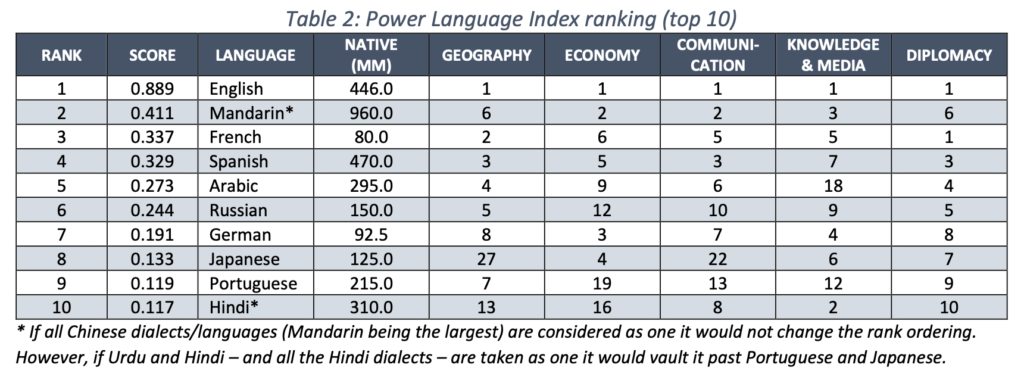These are the most powerful languages in the world by World Economic Forum.
There are over 6,000 languages spoken in the world today, but some 2,000 of them count fewer than 1,000 speakers. Moreover, just 15 account for half of the languages spoken in the world.
In a globalized world with multilingual societies, knowledge of languages is paramount in facilitating communication and in allowing people to participate in society’s cultural, economic and social activities. A pertinent question to ask then is: which are the most useful languages? If an alien were to land on Earth, which language would enable it to most fully engage with humans?
To understand the efficacy of language (and by extension culture), consider the doors (“opportunities”) opened by it. Broadly speaking, there are five opportunities provided by language:
1. Geography: The ability to travel
2. Economy: The ability to participate in an economy
3. Communication: The ability to engage in dialogue
4. Knowledge and media: The ability to consume knowledge and media
5. Diplomacy: The ability to engage in international relations
So which languages are the most powerful?
Based on the opportunities above an index can be constructed to compare/rank languages on their efficacy in the various domains. The Power Language Index (PLI) uses 20 indicators to measure the influence on language (see Table 1). The index measures the usefulness of a language to a representative human being and is not meant to apply to any particular person with their own set of conditions, preferences and geography. Neither is the index a measure of the beauty/merit of a language or its associated culture(s).

https://www.weforum.org/agenda/2016/12/these-are-the-most-powerful-languages-in-the-world/
Reference
- A Teacher’s Guide to TOEIC Listening and Reading Test Preparing Your Students for Success Contents
- How many words do we read per minute? A review and meta-analysis of reading rate
- New General Service List
- PRINCIPLES OF LANGUAGE LEARNING AND THE ROLE OF THE TEACHER
- Study shows how taking short breaks may help our brains learn new skills
- The Power Language Index (PLI)
- TOEIC Service List
- スラッシュ・リーディングの特徴
- Do you read fast enough to be successful?
- Language Categories ーUS Department of State
